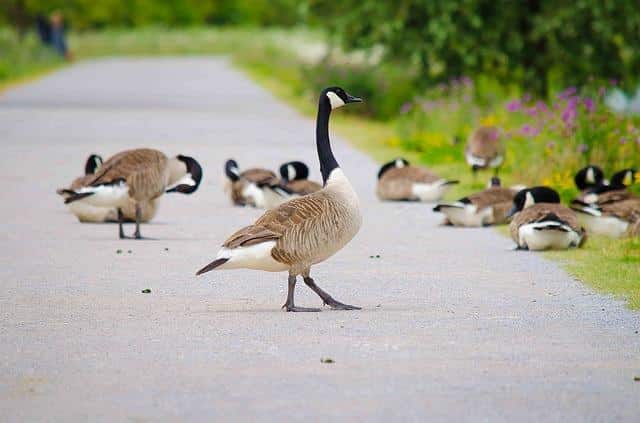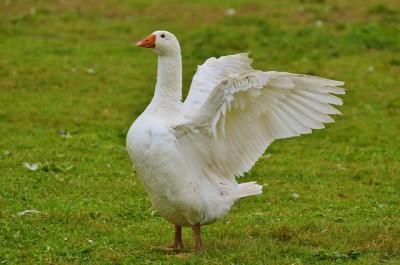
A well-trained guard dog can be an excellent addition to any home security plan. The dog is an active, living threat that can alert you of danger, deter potential attackers and actively defend your home if needed. But training an effective guard dog can be time-intensive, and selecting just the right candidate can be tricky.
What if I told you there were guard dogs that did not need to be trained? Guard dogs that instinctively alarm at strangers, attack intruders, all the while laying tasty eggs and producing rich beef-flavored red meat? Sounds too good to be true? Perhaps you’ve never met a guard goose.
Geese have many instinctive traits that make them better guards than either humans or dogs, and all without any special training. They have been used as a low-tech security solution for centuries, and are still used to protect police stations in China and to patrol prison yards in Brazil.
Naturally Territorial
Geese, especially male geese, are exceptionally territorial. While most domestic geese can still fly, they don’t. Once a location has been established as home base, they’ll fight to the death to defend it from intruders. Geese are commonly used for flock defense (for other poultry) from predators as big as coyotes.
Diatomaceous Earth: The Best Natural De-Wormer For Your Livestock!
They imprint as chicks on both their owners and the other birds or animals around them and identify them as part of the flock. Anyone or anything else is liable to be viciously attacked on sight.
Superior Eyesight & Hearing
With better eyesight than both humans and dogs, and exceptional hearing, they’re perfect for detecting threats both day and night. Geese can see in the ultraviolet spectrum, and with widely spaced eyes on the sides of their head, their field of view is exceptional.
Unstoppable Alarm Capability

Anyone who has ever lived near domestic geese knows they can be exceptionally loud. Once they’ve detected an intruder, there’s no stopping their alarm. While a poorly trained dog can be deterred by tossing it a steak, geese actually get louder when fed. Toss anything in their direction, and the moving object will only strengthen their alarm instinct.
Crippling Attack Strength
As flock animals, they shouldn’t be kept individually. That means that you’ll have multiple guards defending territory. Each goose is armed with a sharp serrated beak capable of inflicting significant damage. The beak, however, is the least of your worries. Goose wings are equipped with bony club -like knobs at the wrists, and once they’re within range, they begin beating their opponent with a force capable of breaking bones. Humans venturing too close to wild goose nests have had arms broken, as well as severe head trauma. These injuries from wild geese are only a sampling of the capacity of a much larger domestic goose. The biggest wild geese only grow to roughly 9 pounds, whereas domestic geese have a lot more girth behind their punch, weighing in at up to 22 pounds.
Easy To Keep
While a dog needs to be fed every day, geese are grazers, and prefer to get most of their calories from grass when it’s plentiful. As excellent foragers, they only require a small amount of supplemental feed if forage is available. Domestic geese do not fly south for the winter, but unlike chickens, they hate spending the winter indoors. Even on the coldest days, they’ll be out patrolling the snow. Their webbed feet and downy coat make excellent insulation, and they only require a modest three-sided shelter even in the northernmost regions of the US. Most geese are excellent and devoted mothers, raising a new flock of guards each year that can be kept to bolster the flock, or raised out for meat to bolster the freezer. They can live for up to 20 years, so their ranks don’t require replacement often.
Other Considerations
On occasion, a goose’s guard instincts can be a little too effective, and they can be a bit overzealous if you do tend to have routine friendly visitors. Considerations will need to be made if you’re expecting a visit from a repair man or a social call from friends, family or neighbors, especially those with young children. While geese do not need to be fenced to stay in their home territory, you may wish to have a small fenced holding pen somewhere to stand down the defenses and allow welcome visitors.
What do you think? Do geese make good “guard dogs”? Share your thoughts in the section below:









